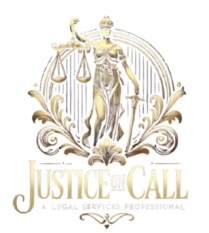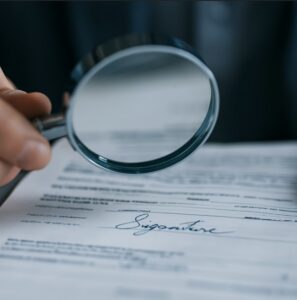Forgery analysis is the process of evaluating documents to detect deception, whether through forged signatures, altered terms, or counterfeit records. Examiners use tools like handwriting comparison, digital forensics, and ink analysis to determine whether a document is genuine or manipulated.
At Justice On Call, our Document Preparation Services include a full review of suspicious files, whether physical or digital, and provide legally sound reports that support court or tribunal proceedings.
What’s the difference between fraud and forgery?
Forgery is the act of altering or creating a false document, such as a forged cheque, fake lease, or faked signature.
Fraud is the broader criminal offense that often uses forged materials to deceive and gain money, power, or legal advantage.
For example:
-
A forged power of attorney = forgery
-
Using that document to steal property = fraud
To learn more about the legal definition and history of forgery, visit this Wikipedia article, which outlines how forgery has evolved across civil and criminal law systems.
Does handwriting analysis actually work?
Yes — handwriting and signature analysis is a proven forensic method used in courts worldwide. Trained professionals evaluate the shape, spacing, pressure, rhythm, and formation of handwritten elements to determine authenticity.
However, it works best when:
-
Compared against verified known samples
-
Accompanied by supporting evidence (e.g., digital timestamps, witness affidavits)
-
Conducted under proper forensic standards
Our office provides handwriting verification as part of broader document fraud analysis — often used in tenancy disputes, will challenges, and identity theft cases.
How much does forensic analysis cost?
The cost for a forensic signature analysis depends on several factors, such as:
-
Number of documents or signatures
-
Whether expert testimony or affidavits are needed
-
Time sensitivity of the review
Typical pricing:
-
$400–$600 for basic comparison and written results
-
$800–$1,200+ for court-admissible reports and witness statements
-
Custom pricing for large cases or trial appearances
We keep our rates transparent. Visit our services page to request a quote.
What is check fraud?
Check fraud refers to intentionally using false, forged, or stolen checks to deceive a person or financial institution into releasing money.
This can include:
-
Writing a check on a closed or fake account
-
Altering the amount or payee on a legitimate check
-
Stealing and depositing someone else’s check
-
Creating counterfeit checks using fake account details
Check fraud is often linked to identity theft, elder exploitation, and other financial crimes.
Is check fraud a federal crime?
Yes — check fraud is a federal offense in many cases. In Canada, it falls under sections of the Criminal Code, including:
-
Section 366 – Forgery
-
Section 368 – Uttering a Forged Document
-
Section 380 – Fraud (Over or Under $5,000)
These offenses carry serious penalties, including:
-
Fines
-
Criminal records
-
Imprisonment
Need forgery analysis? Protect your rights with fast, professional document verification.
📞 Contact Justice On Call today for expert forgery analysis.

